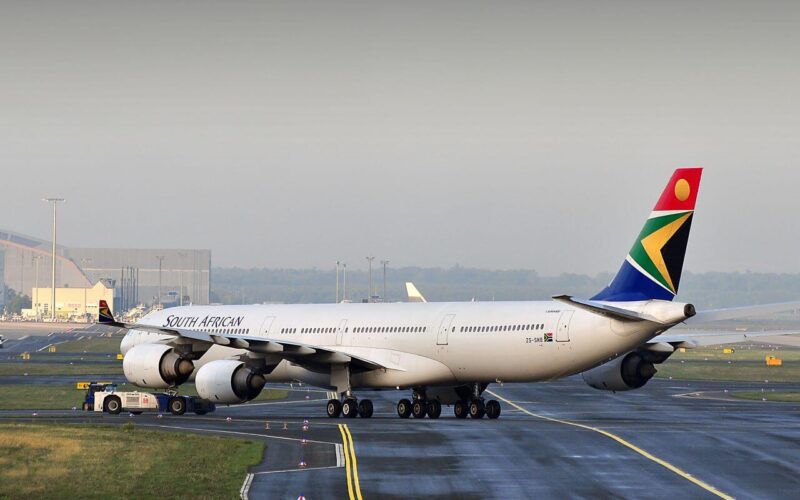State-owned South African Airways (SAA) and Comair have had to ground some of their aircraft for compliance checks after irregularities were discovered during inspection at SAA’s maintenance subsidiary. In total, four airlines have been affected by the simultaneous aircraft groundings and the resulting flight disruptions, including SAA’s low-cost subsidiary Mango Airlines as well as Comair’s budget brand Kulula and flights operated on part of British Airways. While the nature of irregularities remains clouded and questionable, the flight cancellations are indeed real, as is the controversy surrounding SAA’s maintenance unit, which services both the flag carrier and Comair.
The South African Civil Aviation Authority (SACAA) issued a notice on October 21, 2019, regarding “irregular findings” determined during a recent audit of South African Airways Technical (SAAT), a maintenance and technical service provider used by both Comair and South African Airways. According to SACAA, the affected aircraft could not be flown until “corrective action” has been taken, Comair said in a statement on October 22, 2019.
On the same day, South African Airways also announced that it had to recall “some aircraft” as it undertakes the necessary compliance verification “in line with the South African Civil Aviation Authority (SACAA) requirements”. “SAA understands that the inspection conducted by SACAA was in accordance with its regulations and a necessary exercise to ensure compliance and safety,” a statement by the airline reads.
It is not clear what technical issues were identified during the inspection or how many of SAA and Comair’s aircraft have been grounded. Comair did confirm, however, that four of the affected aircraft have been released into service as of the morning of October 22, 2019. The airline says it expects its full fleet, comprised of 26 Boeing 737 jets (10 737-400s and 16 737-800s), to be back in operations by October 23, 2019. South African Airways operates an all-Airbus fleet of 45 aircraft, including A330s, A340s, A320s and A319s.
Both operators have had to revise their flight schedules as a result of the recall of their planes. South African Airways was forced to cancel four domestic flights with others experiencing delays. The airline said that it would combine flights and deploy bigger aircraft to accommodate the affected passengers.
SAA PUBLIC SERVICE ANNOUNCEMENT pic.twitter.com/Bp7D5iSoLx
— SAA – South Africa (@flysaa) October 22, 2019
Echoing its parent, the flag carrier’s low-cost subsidiary Mango Airlines also confirmed that some of its aircraft and flight schedule were affected by the regulator’s notice. The carrier said, however, that it was “confident” that some of the affected planes could resume service “during the course of the day”.
Meanwhile, according to Comair, a third of its services have been affected (as of 10:15 a.m. local time). The Johannesburg-based airline operates regional services on domestic routes as a South African franchise of British Airways and also wholly-owns a low-cost carrier under its own kulula.com brand. According to the latter’s website, four BA flights (operated by Comair) and one of kulula.com have been rescheduled (as of 15:40 p.m. local time).
Latest report by Reuters indicates that South African Airways Technical has provided the SACAA with a plan to fix the issues found in “a few aircraft” during the audit conducted by the regulator. SACCA also reportedly said that the airline operators using SAA maintenance unit’s services had decided to “self-ground” some of their aircraft for the safety checks.
Fake plane parts claims
Earlier this month, on October 6. 2019, the Sunday Times reported on an investigation into an incident involving a Mango Airlines Boeing 737-800, which nosedived en route from Johannesburg to Cape Town on September 2, 2019, forcing it to make an emergency landing at O.R. Tambo International Airport (JNB). According to the newspaper, a preliminary report indicated a defective part, fitted at SAA Technical, had a service history that “could not be determined with certainty’.’
The South African Airways maintenance unit admitted to a “security breach” caused by criminal enterprises, which reportedly looted “hundreds of millions” from the airline through questionable tenders, allegedly dispensing dicy aircraft parts, the South African writes.
In an October 10, 2019, statement, South African Airways confirmed that the cause of the September 2, 2019, incident was related to a component failure, but “categorically” denied claims that its maintenance division was being supplied with faulty aircraft parts or components.
“SAAT received the part from the manufacturer on 5 August 2019. It was fitted on Mango’s aircraft on 7 August 2019 and failed after 96 flights and 125 hours of operation,” the statement reads. “We are awaiting feedback from the OEM – to whom the failed component has been returned to establish the cause of the component failure. Mango and SAAT are providing the required assistance to the SACAA in progressing their investigation”.

